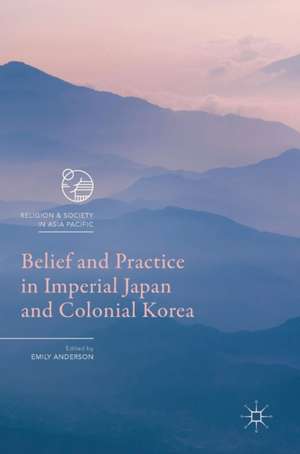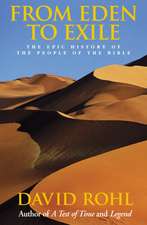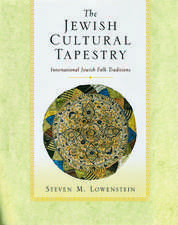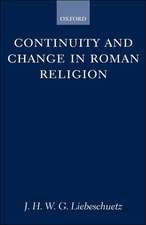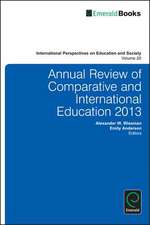Belief and Practice in Imperial Japan and Colonial Korea: Religion and Society in Asia Pacific
Editat de Emily Andersonen Limba Engleză Hardback – 15 dec 2016
| Toate formatele și edițiile | Preț | Express |
|---|---|---|
| Paperback (1) | 942.01 lei 6-8 săpt. | |
| Springer Nature Singapore – 5 iul 2018 | 942.01 lei 6-8 săpt. | |
| Hardback (1) | 948.16 lei 6-8 săpt. | |
| Springer Nature Singapore – 15 dec 2016 | 948.16 lei 6-8 săpt. |
Preț: 948.16 lei
Preț vechi: 1156.29 lei
-18% Nou
Puncte Express: 1422
Preț estimativ în valută:
181.43€ • 189.94$ • 150.12£
181.43€ • 189.94$ • 150.12£
Carte tipărită la comandă
Livrare economică 07-21 aprilie
Preluare comenzi: 021 569.72.76
Specificații
ISBN-13: 9789811015656
ISBN-10: 9811015651
Pagini: 276
Ilustrații: XXVIII, 258 p. 2 illus.
Dimensiuni: 148 x 210 x 23 mm
Greutate: 0.52 kg
Ediția:1st ed. 2017
Editura: Springer Nature Singapore
Colecția Palgrave Macmillan
Seria Religion and Society in Asia Pacific
Locul publicării:Singapore, Singapore
ISBN-10: 9811015651
Pagini: 276
Ilustrații: XXVIII, 258 p. 2 illus.
Dimensiuni: 148 x 210 x 23 mm
Greutate: 0.52 kg
Ediția:1st ed. 2017
Editura: Springer Nature Singapore
Colecția Palgrave Macmillan
Seria Religion and Society in Asia Pacific
Locul publicării:Singapore, Singapore
Cuprins
Introduction: Empire of Religions: Exploring Belief and Practice in Imperial Japan and Colonial Korea.- Finding Religion in Japan’s Empire.- State Shinto Policy in Colonial Korea.- Korean Buddhist Historiography and the Legacies of Japanese Colonialism (1910-1945).- The Adventures of a Japanese Monk in Colonial Korea: Soma Shoei’s Zen Training with Korean Masters.- Eastern Learning Divided: The Split in the Tonghak Religion and the Japanese Annexation of Korea, 1904-1910.- Between God and Caesar: The Position of the Non-Church Movement in Korea and Japan from 1927 to 1945.- Developing an Imperial Theology: Transforming “Others” into “Brothers in Christ” for a Multiethnic Empire.- The Question of Quintessence: Buddhism in Wartime Japanese Academia.- Transnational Contexts of Tenrikyo Mission in Korea: Korea, Manchuria, and the United States.- Poch’ŏn’gyo and the Imperial State: Negotiations between the Spiritual and Secular Governments.- U.S. Occupation Policy on Shinto in Post-Liberation Korea and Occupied Japan.- Religion in Occupied Japan: The Impact of SCAP’s Policies on Shinto.
Notă biografică
Emily Anderson received her PhD from UCLA in 2010 and from 2010 to 2014 was Assistant Professor of Modern Japanese History at Washington State University (Pullman, WA); in 2014 she was visiting researcher at the New Zealand Asia Institute, University of Auckland. She is the author of Christianity and Imperialism in Modern Japan: Empire for God (2014).
Textul de pe ultima copertă
Bringing together the work of leading scholars of religion in imperial Japan and colonial Korea, this collection addresses the complex ways in which religion served as a site of contestation and negotiation among different groups, including the Korean Choson court, the Japanese colonial government, representatives of different religions, and Korean and Japanese societies. It considers the complex religious landscape as well as the intersection of historical and political contexts that shaped the religious beliefs and practices of imperial and colonial subjects, offering a constructive contribution to contemporary conflicts that are rooted in a contested understanding of a complex and painful past and the unresolved history of Japan’s colonial and imperial presence in Asia. Religion is a critical aspect of the current controversies and their historical contexts. Examining the complex and diverse ways that the state, and Japanese and colonial subjects negotiated religious policies,practices, and ministries in an attempt to delineate these “imperial relationships”, this cutting edge text sheds considerable light on the precedents to current sources of tension.
Caracteristici
Considers how religion is situated at the intersection of key historical debates in imperial Japan and colonial Korea Situates religious practice and belief at the heart of nation building in East Asia and Japan’s emergence as a modern empire Reflects on current conflicts in the region rooted in the unresolved history of Japan’s colonial and imperial presence in Asia
